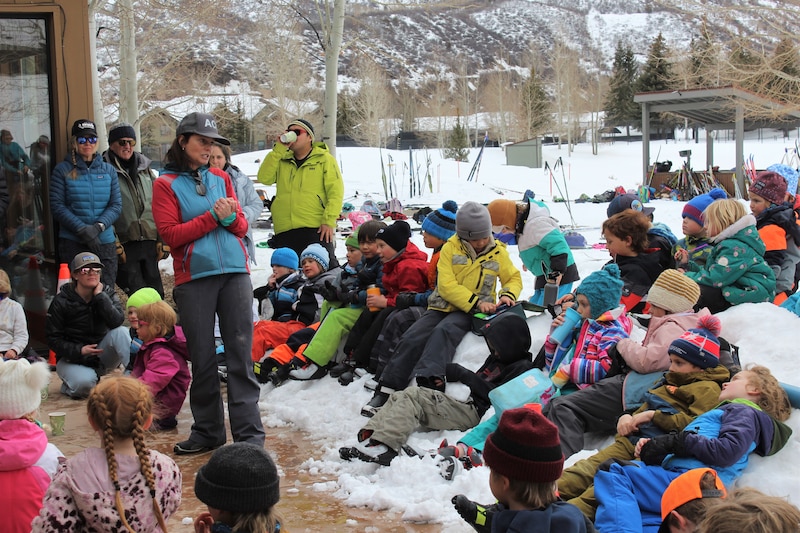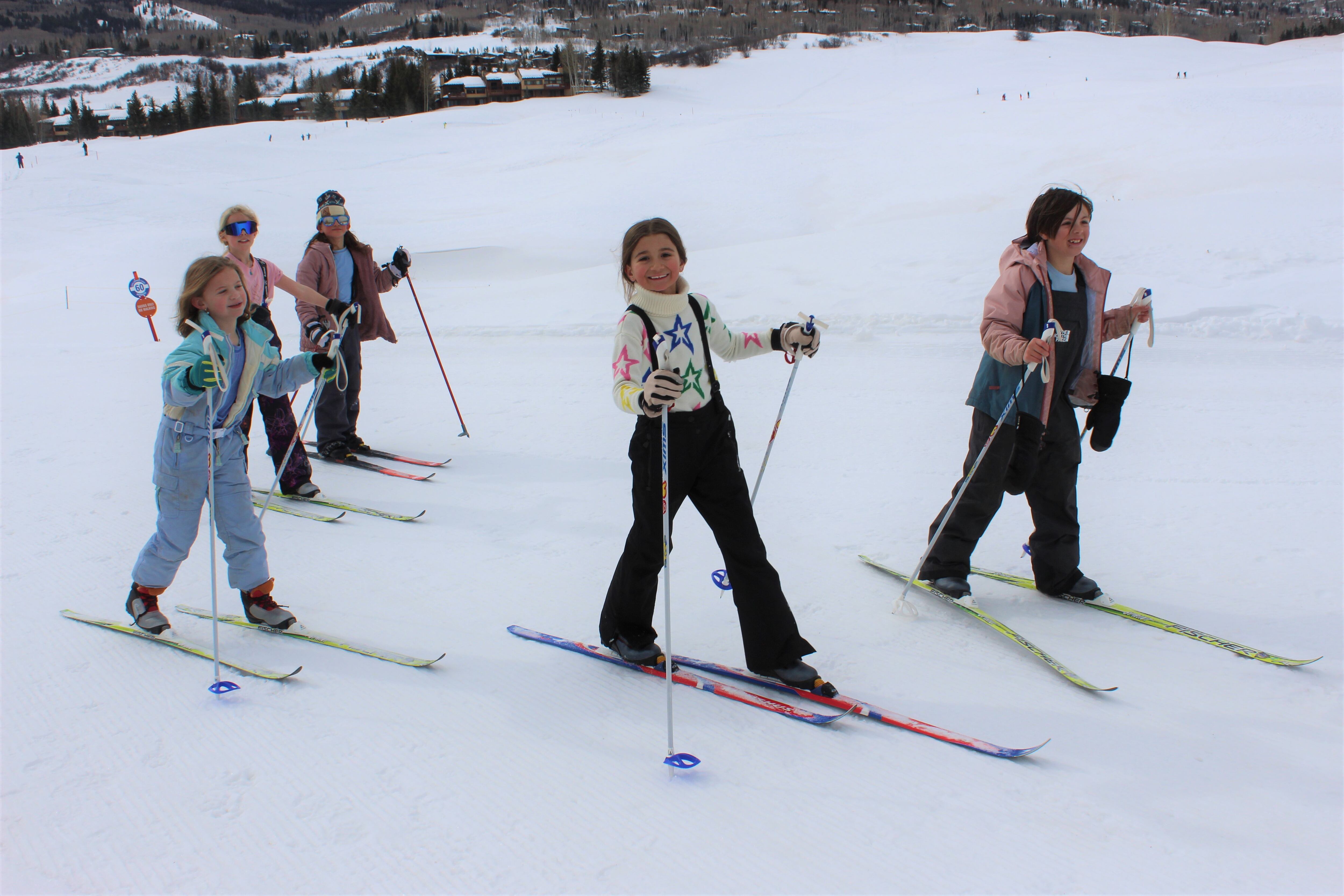This story originally aired on Aspen Public Radio and is republished with permission.
After a string of school threats over the last month and a half, many students, teachers and families in the valley have been on edge.
The three false threats each happened on a Wednesday morning and schools were bracing themselves for the possibility of another one last week.
A threat didn’t materialize last week, but instead of waiting to find out whether they’d have to secure their buildings yet again, teachers and administrators at the Aspen Community School decided to do something different.
So on the morning of Wednesday, March 8, over a hundred K-8 students gathered for a day of cross-country skiing at the Snowmass Nordic Center.
After students and teachers took a few laps on the trails, ACS principal Casey White called a brief all-school meeting.
“So last Wednesday, you guys probably remember we had an all-school meeting and then shortly after you got the message that we were going to secure the building again,” she said to students and staff. “And you know what I noticed? The kindergarteners were already out cross-country skiing. And all of a sudden an idea hit, ‘Maybe we should all do that.’”
White ran the idea by her staff first, and then alerted families and local law enforcement that they would be doing a school ski day.
“So one week later here we are, we are all out cross-country skiing because you have been so powerful in being able to stay calm and to help us through times that we don’t really know what’s coming next,” she said. “So thank you for coming out here.”
Out on the trails, fourth-grade student Kai Waanders was skiing with a few of his classmates.
“It’s amazing that we get to be out here instead of being inside a school all locked up like the last few Wednesdays,” he said. “It was kind of surprising and a little scary to have such a surprise — it hasn’t happened once last year or the year before.”
While some schools in the area received direct threats and had to go into full lockdowns, the Aspen Community School went into “secure” mode as a safety precaution.
Under a “secure protocol,” all doors are locked and no one is allowed in or out of the main school building while classes continue.
Waanders said that even though he was worried thinking about all the “what ifs,” he also felt safe.
“I knew that we had a community and people that could help us if something were to ever happen, and I knew that we’ve been preparing for it since kindergarten,” he said.
School lockdown drills aren’t the only way that Waanders and his classmates have been preparing for situations like this.
For years, Aspen Community School has been offering what it calls “social emotional” learning.
“It was a group of us on a very grassroots level, sitting around in our old building,” said White. “The question was, ‘What do we want for our ACS graduates? What character traits do we want our students to embody?’”
They eventually landed on five traits that are now the core of the school’s social emotional program: kindness, compassion, empathy, tolerance, and patience.
White said teachers and staff shape their curriculum to help kids learn those skills.
“We feel like when you can embed the tools to be able to self-calm and to navigate social problems and to apologize when needed — when you can do that in a setting that’s not super stressful, like cross-country skiing or a normal day in the classroom, then when something tough comes up, you’ve got the muscle,” she said.

ACS also works with Lily Larkin, a licensed clinical social worker and wellness teacher from the Aspen Hope Center.
Larkin is one of the center’s twelve school-based clinicians in the valley and she spends four days a week at ACS.
“One of the things we work on is knowing that when our brains go into a fight, flight or freeze response, we’re not necessarily going to learn effectively in that state of mind,” she said.
When the school went into “secure,” Larkin says teachers created a sense of safety by tailoring classroom activities to how the students were feeling and coming up with projects that weren’t necessarily part of the regular school day.
“So they were doing art projects in the classroom, they were knitting, they were doing a lot of really wonderful hands-on activities to support them in that moment,” she said.
Larkin is also a parent at ACS and she appreciated that teachers went around to each class and told students in an age-appropriate way what was happening, while it was happening.
“So when my first-grader came home after having the experience, she just looked at me and she said, ‘Mom, somebody was trying to scare our school today,’” Larkin said. “And that’s how she described it.”
Some of the social emotional skills the school teaches, such as the “breathing tool” and the “listening tool,” are also helpful for parents.
“When my daughter comes home and she is visibly upset about something, but she tells me that she’s fine, I can look at her and I can say, ‘Sweetheart, if I’m listening with my eyes, ears, and heart, I can tell that there is something wrong — and you don’t have to tell me right now, but I’m here for you and I wanna hear about it,’” she said. “And that’s the ‘listening tool.’”
As a parent, Larkin is especially grateful to teachers who’ve supported families and kids through everything from the pandemic to school threats.
“Teachers are absolutely heroes and they have become, in the last decade or so, first responders,” she said. “It really feels like that has amped up a lot.”
Back at the nordic center, a group of middle-school students who regularly meet with Larkin were taking a ski break.
“Once a week we go down to her classroom and we sit in a circle and she asks us questions and we answer them altogether,” said sixth-grade student Annalise Ingram. “Also if you need some more time, you can just go down and see her anytime.”
Fellow sixth-grader, Anderson Tippet, said he appreciated the questions that Larkin asked them after the recent threats.
“One of them was like, ‘How are you dealing with this?’ ‘What makes you feel better or helps you not be as nervous about it?’” he recalled.
Tippet said he’s realized that having friends close by helps.
“Most of us have been together since kindergarten, so we’re all really good friends,” he said.
For her part, Larkin said she’s impressed by her students.
“They have moved through all of the feelings related to the last few Wednesdays and it’s so fun to see everybody together smiling, falling over, laughing, picking each other up,” she said.
The group of students agreed that they’re also proud of each other and grateful for their teachers and the whole community.
“Even when we were stuck inside, we still got through it really nicely by working together,” said fourth-grade student Cora Chimerakis. “The teachers just made it all happen and I’m really thankful for them — and thank you for the community always being there for us.”
Eleanor Bennett is an award-winning journalist and Morning Edition anchor. Eleanor has reported on a wide range of topics in her community, including the impacts of federal immigration policies on local DACA recipients, the Valley’s COVID-19 eviction and housing crisis, and hungry goats fighting climate change across the West through targeted grazing.






